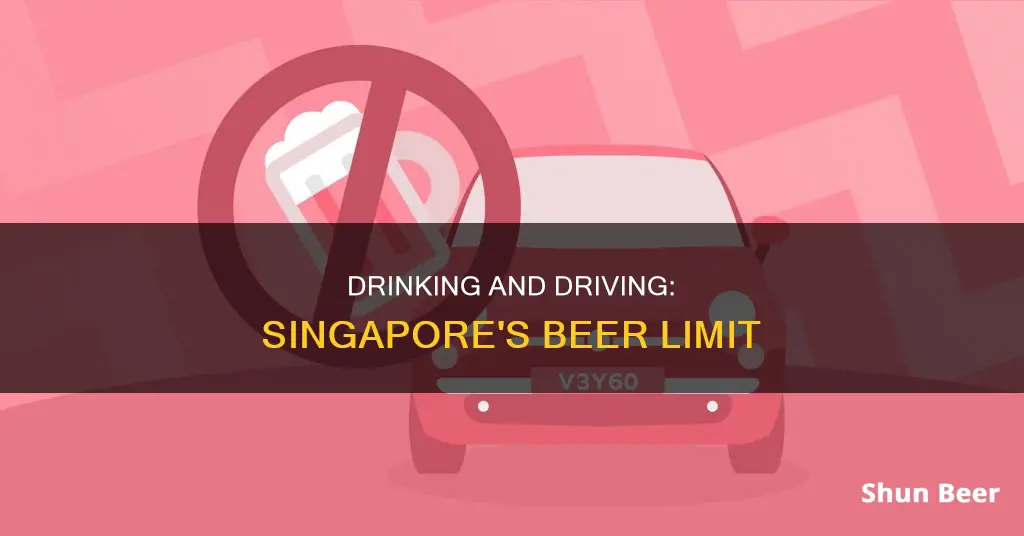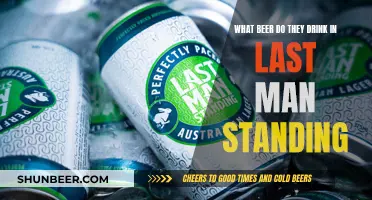
Drink-driving is a serious offence in Singapore, with penalties ranging from fines to imprisonment and even the forfeiture of vehicles. The legal alcohol limit in Singapore is 35 mg of alcohol per 100 ml of breath or 80 mg of alcohol per 100 ml of blood. If you are found to be driving with a higher blood alcohol content, you will be penalised according to the Road Traffic Act (RTA). The penalties for drink-driving in Singapore were increased in 2019, and now first-time offenders can expect fines of up to $10,000 and up to a year in prison, as well as a minimum two-year ban from driving. Repeat offenders face even harsher penalties, with fines of up to $20,000 and up to two years in prison, as well as a minimum five-year ban from driving.
| Characteristics | Values |
|---|---|
| Legal alcohol limit in breath | 35 microgrammes of alcohol per 100ml of breath |
| Legal alcohol limit in blood | 80 milligrammes of alcohol per 100ml of blood |
| Breath test refusal | Arrest without a warrant |
| First-time drink-driving offence penalty | Fine of between $2,000 and $10,000 and/or up to 1 year's jail |
| Repeat drink-driving offence penalty | Fine of between $5,000 and $20,000 and/or up to 2 years' jail |
| Driving disqualification for first-time offenders | Minimum of 2 years |
| Driving disqualification for repeat offenders | Minimum of 5 years |
What You'll Learn

Singapore's legal drink-driving limit
Singapore has strict laws and penalties for drink-driving. The legal alcohol limit in Singapore is 35 mg of alcohol per 100 ml of breath or 80 mg of alcohol per 100 ml of blood. This means that if you are found to have a higher concentration of alcohol in your system while driving, you will be penalised. The specific penalties depend on several factors, including the extent of harm caused and the offender's culpability.
For first-time offenders, the penalty includes a fine ranging from $2,000 to $10,000, imprisonment of up to 12 months, or both. Additionally, the court will impose a minimum two-year ban from driving unless there are special reasons not to do so. The authorities may use a breathalyser to measure an individual's blood alcohol content, and if they refuse to comply without a reasonable excuse, they can be arrested without a warrant and treated as having committed a drink-driving offence.
Repeat offenders face more severe consequences, including a compulsory jail term of up to two years, a fine ranging from $5,000 to $20,000, and a minimum five-year ban from driving. The period of disqualification from driving may be longer if the offender has also been convicted of dangerous or careless driving.
It is important to note that even if your blood alcohol content is within the legal limit, you can still be charged with drink-driving if you are deemed incapable of properly controlling your vehicle due to intoxication. This means that it is always best to avoid drinking entirely if you plan to drive and to use public transportation or alternative arrangements instead.
Mountain Men and Their Beer Drinking Habits
You may want to see also

Factors influencing how much you can drink before driving
The amount of alcohol you can consume before driving depends on a variety of factors, and it is challenging to calculate this accurately. Here are some key considerations:
- Weight: Body weight influences BAC levels. Heavier individuals typically have a lower BAC than lighter individuals when consuming the same amount of alcohol.
- Gender: Women usually have a higher BAC than men when consuming the same amount of alcohol due to differences in body composition, particularly body fat and water content.
- Food Intake: Eating before or while drinking can slow alcohol absorption, leading to a lower BAC. Drinking on an empty stomach increases BAC faster.
- Rate of Consumption: Binge drinking or consuming multiple drinks in a short period can cause your BAC to rise quickly because your body cannot break down alcohol as fast as you are drinking it.
- Age: Older individuals often have higher BAC levels compared to younger people due to factors such as decreased body water content and a slower alcohol elimination rate.
- Metabolism: Individual metabolic rates can vary, affecting how quickly alcohol is processed by the body.
- Health and Medication: Overall health, liver function, and certain medications or health conditions can impact how efficiently your body metabolises alcohol.
- Tolerance: Regular drinkers may develop a higher tolerance to alcohol, meaning their BAC may be elevated while they still feel less affected by the alcohol.
- Type and Amount of Alcohol: The type of drink and the total amount consumed will impact your BAC. Even a small amount of alcohol can affect your driving ability.
It is important to note that there is no foolproof way to drink and drive safely. The effects of alcohol on driving abilities are well-established, and the risks are significant. The best approach is to avoid drinking entirely if you plan to drive and to always have a designated driver or alternative transportation arranged if you intend to consume alcohol.
Beer or Liquor: Which Should You Drink First?
You may want to see also

Drink-driving penalties in Singapore
Drink-driving is a serious offence in Singapore, with harsh penalties for those found guilty. The legal alcohol limit in Singapore is 35 mg of alcohol per 100 ml of breath or 80 mg of alcohol per 100 ml of blood. This means that if your blood alcohol content is above these limits, you are breaking the law and can be charged with drink-driving. The penalties for drink-driving in Singapore include fines, jail time, and driving bans.
If you are convicted of drink-driving in Singapore, you face a fine of up to $10,000 and a jail term of up to 12 months for a first offence. Repeat offenders face higher penalties, with fines of up to $20,000 and jail terms of up to two years. Additionally, drink-driving offenders will be disqualified from driving for a minimum of two years, or five years for repeat offenders. These penalties are designed to deter people from drink-driving and to keep the roads safe.
The specific penalty imposed will depend on the individual circumstances of each case, including the offender's level of intoxication, driving behaviour, and the harm caused. The Court will consider the extent of the harm caused by the offence and the offender's culpability when deciding on the sentence. If there are aggravating factors such as dangerous driving, driving in a school zone, or causing an accident, the sentence will be higher. On the other hand, mitigating factors such as genuine remorse or a young age may result in a lower sentence.
It is important to note that even if your blood alcohol content is below the legal limit, you can still be charged with drink-driving if you are deemed unfit to drive due to intoxication. The police have the power to require you to provide a breath or blood specimen for testing, and refusing to comply can result in arrest and charges. The best way to avoid drink-driving is to refrain from drinking if you plan to drive or to use alternative transportation methods such as public transport or taxis.
COVID and Beer: Is Drinking Safe?
You may want to see also

Other punishments for drink-driving in Singapore
Drink-driving in Singapore can have serious consequences, including the potential for loss of life. The authorities take a dim view of those driving under the influence of alcohol or other banned substances, and the laws are very clear on the punishments. Here are some of the other punishments for drink-driving in Singapore:
- Suspension of licence: The Traffic Police may suspend your driving licence immediately if you’re caught driving under the influence. This ensures that irresponsible drivers are kept off the road until the Courts can decide on their cases.
- Forfeiture of vehicle: The Court may order that your vehicle be forfeited if you have committed offences related to DUI.
- Disqualification from driving: For first-time offenders, the Court will require them to pay a fine ranging from $2,000 to $10,000. They may also impose a maximum of a 12-month imprisonment term. The driver will receive a minimum 2-year ban from driving, unless the Court has special reasons not to disqualify the driver.
- Inability to make insurance claims: Most insurers will refuse to cover policy claims on car damages resulting from drink-driving. They will not pay for expenses from damages, injuries, or losses, regardless of the type of insurance policy you have. They may also reject claims under comprehensive car insurance. Offenders risk shouldering legal fees, vehicular repair or maintenance costs, and other medical expenses.
It is important to note that the Court will consider two key factors when deciding on an appropriate sentence for a convicted drink-driver: the extent of the harm caused by the offence and the degree of the offender's culpability.
Beer and Pradaxa: Is It Safe to Drink Alcohol?
You may want to see also

How to avoid drink-driving
Drinking and driving is a serious issue that can lead to injuries, fatalities, and legal consequences. In Singapore, the legal blood alcohol limit for driving is 80 milligrams per 100ml of blood, or 0.08% blood alcohol content (BAC). The legal breath alcohol limit is 35 micrograms of alcohol per 100ml of breath. Even a small amount of alcohol can affect your driving ability, so it is always best to avoid drinking entirely when you plan to drive. Here are some tips to avoid drink-driving:
Plan Ahead
Before going out, decide on a designated driver for your group who will abstain from drinking. If you are going out alone, commit to not drinking and stick to non-alcoholic beverages. You can also use public transportation or ride-sharing services to get to your destination.
Moderate Your Consumption
If you do choose to drink, practise responsible drinking habits. Eat a snack or meal before drinking, and continue to eat while drinking. Drink slowly and alternate alcoholic drinks with water or other non-alcoholic beverages. Be mindful of the amount and type of alcohol you consume, as different drinks have varying alcohol content.
Understand Your Limits
Keep track of how many drinks you've had and how long you've been drinking. As a rough guide, wait at least one hour for each standard drink before driving. However, it's important to remember that there is no foolproof way to calculate your BAC, and it can take many hours for alcohol to leave your system. Factors such as weight, age, sex, metabolism, and liver health can influence how your body processes alcohol.
Look Out for Each Other
If you notice a friend has had too much to drink, take their keys and arrange alternative transportation for them. Offer alcohol-free beverages at parties and remind guests to designate a sober driver or use ride-sharing services.
Be Aware of the Risks
Educate yourself and others, especially teens, about the dangers of drinking and driving. Understand the signs of drunk driving, such as weaving, swerving, or slow response to traffic signals, and report any suspected drunk drivers by calling the police and providing vehicle and location details.
Plants and Beer: A Refreshing Combination?
You may want to see also
Frequently asked questions
There is no exact amount of beer one can drink and still be considered fit to drive in Singapore. This depends on many factors, including weight, age, sex, metabolism, food intake, type of alcohol, and amount consumed. The legal alcohol limit in Singapore is 35 microgrammes of alcohol per 100ml of breath or 80 milligrammes of alcohol per 100ml of blood.
Refusing to take a breathalyser test without a reasonable excuse is considered an offence in Singapore. According to Section 70 (4) of the Road Traffic Act, you will be treated as if you have committed the offence of drunk driving and may face penalties.
The penalties for drink-driving in Singapore include fines, jail time, disqualification from driving, suspension of licence, forfeiture of vehicle, and inability to make insurance claims. For a first-time offender, the fine ranges from $2,000 to $10,000, and/or up to 12 months of imprisonment. Repeat offenders face higher fines and longer jail sentences, with a minimum disqualification from driving for five years.
Yes. Even if your blood alcohol level is below the legal limit, you can still be charged with drink-driving if you are deemed incapable of properly controlling your vehicle. This falls under Section 67 of the Road Traffic Act, which states that a person can be found guilty of drink-driving if they are unfit to drive due to intoxication.







